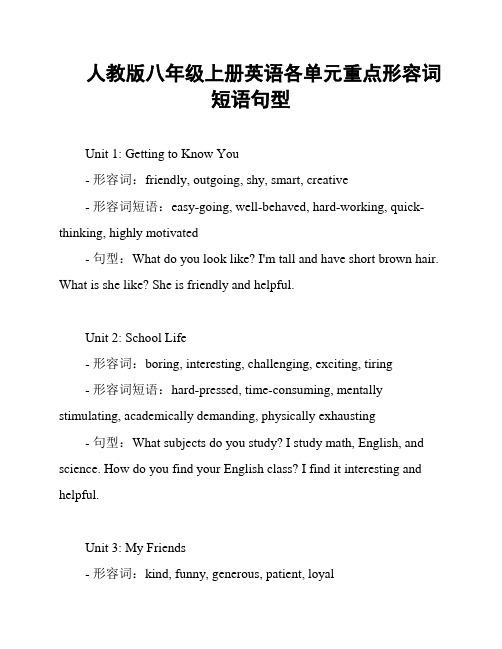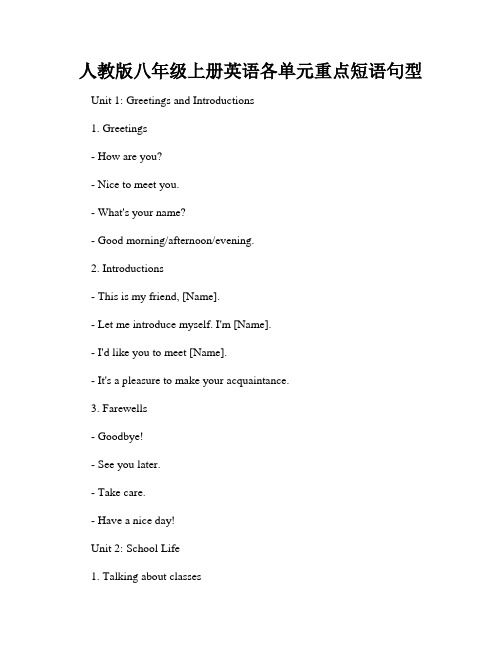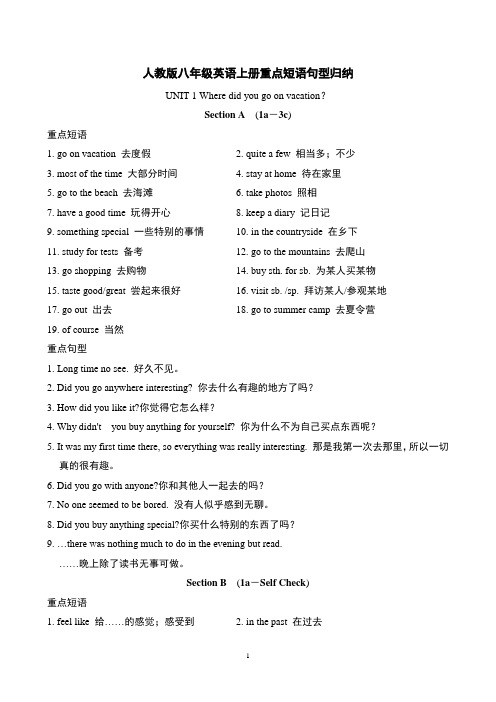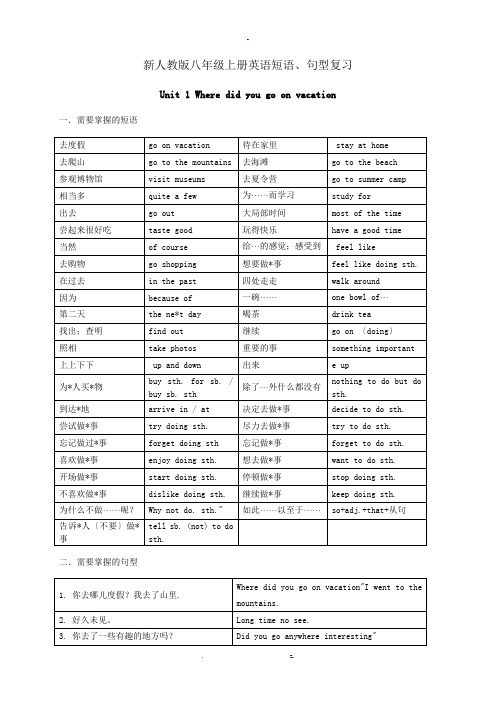人教版英语八年级上册全册重点句型汇总
人教版八年级上册英语各单元重点形容词短语句型

人教版八年级上册英语各单元重点形容词短语句型Unit 1: Getting to Know You- 形容词:friendly, outgoing, shy, smart, creative- 形容词短语:easy-going, well-behaved, hard-working, quick-thinking, highly motivated- 句型:What do you look like? I'm tall and have short brown hair. What is she like? She is friendly and helpful.Unit 2: School Life- 形容词:boring, interesting, challenging, exciting, tiring- 形容词短语:hard-pressed, time-consuming, mentally stimulating, academically demanding, physically exhausting - 句型:What subjects do you study? I study math, English, and science. How do you find your English class? I find it interesting and helpful.Unit 3: My Friends- 形容词:kind, funny, generous, patient, loyal- 形容词短语:always there for me, full of humor, never let me down, extremely caring, incredibly supportive- 句型:Do you have close friends? Yes, I have a few close friends. What do you like about them? I like their sense of humor and their loyalty.Unit 4: Hobbies and Interests- 形容词:exciting, relaxing, enjoyable, fascinating, addictive- 形容词短语:highly engaging, incredibly satisfying, deeply captivating, incredibly addictive, extremely challenging- 句型:What are your hobbies? My hobbies are reading and playing sports. How do you feel when you engage in these activities? I find them relaxing and enjoyable.Unit 5: Festivals and Celebrations- 形容词:colorful, festive, joyful, traditional, memorable- 形容词短语:rich in culture, culturally significant, highly anticipated, deeply rooted, widely celebrated- 句型:What festivals do you celebrate? I celebrate Chinese New Year and Christmas. How do you celebrate them? We have family gatherings, eat special food, and exchange gifts.Unit 6: Health and Fitness- 形容词:healthy, fit, energetic, active, balanced- 形容词短语:physically fit, mentally alert, emotionally stable, nutritionally balanced, holistically healthy- 句型:How do you keep fit? I exercise regularly and eat a balanced diet. How do you feel when you are healthy and fit? I feel energetic and active.Unit 7: Travel and Adventure- 形容词:adventurous, thrilling, breathtaking, cultural, picturesque- 形容词短语:filled with excitement, heart-pounding, awe-inspiring, culturally enriching, visually stunning- 句型:Do you like traveling? Yes, I love traveling and exploring new places. How do you describe your travel experiences? They are adventurous and culturally enriching.Unit 8: Environment and Pollution- 形容词:clean, polluted, green, sustainable, eco-friendly- 形容词短语:environmentally conscious, pollution-free, resource-efficient, eco-friendly practices, sustainable development - 句型:How do you protect the environment? I reduce, reuse, and recycle. What do you think about pollution? I think pollution is harmful to both humans and the environment.。
初中英语人教版八年级上册重点短语+句型+常用语法汇总(1-5单元)

八年级英语上册重点知识汇总Unit 1 Where did you go on vacation?【本单元的话题】谈论假期活动内容,复习一般过去时。
【本单元的语法】1复习一般过去时;2.学习不定代词和不定副词的用法。
【不定代词和不定副词的用法】(1)左边的some、any、every、no与右边的body、one、thing构成不定代词,some、any、every、no 与右边的疑问副词where构成不定副词;(2)一般情况下以some开头的不定代词和不定副词用于肯定句,以any开头的不定代词和不定副词用于否定句、疑问句;以no开头的不定代词和不定副词表示否定含义(no one为两个单词);(3)不定代词或不定副词和形容词连用时,形容词放在后面。
He has something important to do.他有重要的事情要做。
(肯定句用something,形容词important放后)Did you buy anything special? (一般疑问句用anything,形容词special放后)Did you go anywhere interesting last month?上个月你去令人感兴趣的地方了吗?(一般疑问句用不定副词anywhere,形容词interesting放后)(4)不定代词和不定副词做主语时,后面的动词用单数形式。
Everone is here today.今天每个人都在这里。
【本单元的短语和知识点】1.go on vacation去度假go to the mountains 上山/进山2.stay at home呆在家go to the beach去海滩visit museums 参观博物馆go to summer camp去参观夏令营3.study for tests为考试而学习\备考go out出去4.quite a few相当多,不少(后跟可数名词复数)take photos照相most of the time大部分时间5.buy sth for sb = buy sb sth为某人买某物6.taste good.尝起来很好taste(尝起来)、look(看起来)、sound(听起来)为感官动词,后跟形容词7.have a good\great\fun time过得高兴,玩得愉快(=enjoy oneself)8.go shopping去购物9.nothing…but+动词原形:除了……之外什么都没有He had nothing to do at home but read yesterday.昨天他在家除了读书无事可做。
人教版|八年级上册英语所有必考点大汇总

人教版|八年级上册英语所有必考点大汇总Unit1 Where did you go on vacation?【重点语法】不定代词:不指名代替任何特定名词或形容词的代词叫做不定代词。
用法注意:1. some 和any +可数名/不可数名。
some 多用于肯定句,any多用于否定句、疑问句和条件从句。
有些问句中用some,不用any, 问话者希望得到对方肯定回答。
2. 由some, any, no, every 与body, one, thing构成的复合不定代词作主语时,其谓语动词用三单。
3. 不定代词若有定语修饰,该定语要置于其后:如:something interesting【重点短语】1. buy sth for ab./ buy sb. sth 为某人买某物2. taste + adj. 尝起来……3. nothing...but + V.(原形) 除了……之外什么都没有4. seem + (to be) + adj 看起来5. arrive in + 大地方/ arrive at + 小地方到达某地6. decide to do sth. 决定做某事7. try doing sth. 尝试做某事/ try to do sth. 尽力做某事8. enjoy doing sth. 喜欢做某事9. want to do sth. 想去做某事10. start doing sth. 开始做某事=begin doing sth.11. stop doing sth. 停止做某事区分:stop to do sth. 停下来去做某事12. dislike doing sth. 不喜欢做某事14. so + adj + that + 从句如此……以至于……16. tell sb. (not) to do sth. 告诉某人(不要)做某事17. keep doing sth. 继续做某事18. forget to do sth. 忘记去做某事/ forget doing sth 忘记做过某事【词语辨析】1. take a photo/ take photos 拍照quite a few+名词复数“许多…”2. seem + 形容词看起来…... You seem happy today.seem + to do sth. 似乎/好像做某事I seem to have a coldIt seems + 从句似乎..…. It seems that no one believe you. seem like ... 好像,似乎….. It seems like a good idea.3. arrive in +大地点= get to= reach+地点名“到达......”arrive at +小地点(注:若后跟地点副词here/there/home, 介词需省略,如:arrive here; get home)4. feel like sth 感觉像…feel doing sth. 想要做某事5. wonder(想知道)+疑问词(who, what, why)引导的从句。
人教版八年级上册英语各单元重点短语句型

人教版八年级上册英语各单元重点短语句型Unit 1: Greetings and Introductions1. Greetings- How are you?- Nice to meet you.- What's your name?- Good morning/afternoon/evening.2. Introductions- This is my friend, [Name].- Let me introduce myself. I'm [Name].- I'd like you to meet [Name].- It's a pleasure to make your acquaintance.3. Farewells- Goodbye!- See you later.- Take care.- Have a nice day!Unit 2: School Life1. Talking about classes- What's your favorite subject?- I enjoy studying [subject].- My least favorite subject is [subject].- I'm good at [subject].2. Describing teachers- Our teacher is very kind.- Mr./Mrs. [Name] is great at explaining things. - I find our teacher strict but fair.- The teacher always makes the class interesting.3. Discussing school activities- I'm in the school choir/football team.- We have an upcoming school trip.- The school is organizing a charity event.- The annual school concert is next week.Unit 3: Hobbies and Interests1. Talking about hobbies- My hobbies include reading and painting.- I love playing basketball with friends.- In my free time, I enjoy playing video games.- Swimming is one of my favorite activities.2. Sharing preferences- I prefer watching movies over reading books.- I'm more interested in outdoor activities than indoor ones. - I'd rather listen to music than watch TV.- I enjoy both playing and watching sports.3. Making plans- Shall we go to the cinema on Saturday?- How about meeting at the park tomorrow?- Let's have a picnic next weekend.- We could go shopping after school.Unit 4: Family and Friends1. Describing family members- I have one brother and two sisters.- My mom is a doctor, and my dad is a teacher.- My grandparents live with us.- I'm the youngest/oldest in my family.2. Talking about friends- I have a close friend named [Name].- My best friend and I have known each other since kindergarten. - We enjoy spending time together.- My friend is very supportive and always there for me.3. Discussing family activities- Every Sunday, we have a family dinner.- We often go on family trips during holidays.- Our family likes to watch movies together.- We sometimes play board games as a family.Unit 5: Daily Routine1. Describing daily activities- I wake up at 7 am every morning.- After breakfast, I brush my teeth and get dressed.- I take the bus to school.- In the evenings, I do my homework and relax.2. Talking about time- What time do you go to bed?- I have lunch at noon.- We start school at 8:30 am.- It's time to go to the dentist.3. Discussing habits- I always eat breakfast before leaving for school.- I often exercise in the evening.- She sometimes helps her mom in the kitchen.- They rarely go to bed late on weekdays.Unit 6: Celebrations1. Talking about birthdays- My birthday is on [date].- I usually celebrate my birthday with family and friends.- On my birthday, I receive presents and eat cake.- This year, I will have a small party at home.2. Describing festivals- We celebrate Chinese New Year with dragon dances.- Christmas is a time for giving and sharing.- During Diwali, we light oil lamps and exchange gifts.- The Mid-Autumn Festival is known for mooncakes.3. Discussing traditions- It's a tradition to give red envelopes during Lunar New Year. - We always decorate the Christmas tree together.- On Independence Day, there are fireworks and parades.- During Thanksgiving, we gather with family and give thanks.。
人教版八年级英语上册重点短语句型归纳

人教版八年级英语上册重点短语句型归纳UNIT 1 Where did you go on vacation?Section A(1a-3c)重点短语1. go on vacation 去度假2. quite a few 相当多;不少3. most of the time 大部分时间4. stay at home 待在家里5. go to the beach 去海滩6. take photos 照相7. have a good time 玩得开心8. keep a diary 记日记9. something special 一些特别的事情10. in the countryside 在乡下11. study for tests 备考12. go to the mountains 去爬山13. go shopping 去购物14. buy sth. for sb. 为某人买某物15. taste good/great 尝起来很好16. visit sb. /sp. 拜访某人/参观某地17. go out 出去18. go to summer camp 去夏令营19. of course 当然重点句型1. Long time no see. 好久不见。
2. Did you go anywhere interesting? 你去什么有趣的地方了吗?3. How did you like it?你觉得它怎么样?4. Why didn't you buy anything for yourself? 你为什么不为自己买点东西呢?5. It was my first time there, so everything was really interesting. 那是我第一次去那里,所以一切真的很有趣。
6. Did you go with anyone?你和其他人一起去的吗?7. No one seemed to be bored. 没有人似乎感到无聊。
人教版英语八年级上册全册教材全解

人教版英语八年级上册Unit 10 If you go to the party,you'll have a greattime!教材全解【教材内容解析】Section A1.If you go to the party, you'll have a great time。
(P. 73)have a great time意为“过得愉快、玩得开心”,相当于enjoy oneself或者have fun。
They are having a great time in the park.=They are enjoying themselves in the park。
2. The students are talking about when to have a class party/a class meeting/a birthday party. (P。
74)have a class meeting意为“开班会"。
We will have a class meeting next week.3。
What will Mark organize?(P。
74)organize用作及物动词,表示“组织、安排”,后接表示组织、活动类的名词做宾语,名词形式为organization表示“组织”.Last month, we organized a party。
4.。
let’s order food from a restaurant。
(P。
74)order此处表示“订购、点菜”,order sth. from。
.。
表示“从……订购某物"。
I ordered some chicken from that shop。
【拓展】order还可以作及物动词,意为“命令”,表示“命令”时,常用于order sb。
(not) to do sth。
结构中The police ordered him to wait right here。
人教版八年级上册英语各单元重点短语句型

新人教版八年级上册英语短语、句型复习
Unit 1 Where did you go on vacation 一.需要掌握的短语
二.需要掌握的句型
Unit 2 How often do you e*ercise" 一.需要掌握的短语
.
二.需要掌握的句型
Unit 3 I’m more outgoing than my sister. 一.需要掌握的短语
Unit 4 What’s the best movie theater"
一.需要掌握的短语
二.需要掌握的句型
Unit 5 Do you want to watch a game show" 一.需要掌握的短语
Unit 6 I’m going to study puter science.
一.需要掌握的短语
Unit 7 Will people have robots" 一.需要掌握的短语
二.需要掌握的句型
Unit 8 Will people have robots"
一.需要掌握的短语
二.需要掌握的句型
Unit 9 Can you e to my party" 一.需要掌握的短语
二.需要掌握的句型。
人教版八年级上册英语重点句型归纳

人教版八年级上册英语重点句型归纳一、祈使句1. 肯定祈使句:动词直接用原形,如:Look at the blackboard.2. 否定祈使句:在动词前加Don’t, 如:Don’t talk in class.二、一般现在时1. 肯定句:主语+动词原形,如:She sings well.2. 否定句:主语+动词原形+not,如:They do not like playing football.三、一般过去时1. 肯定句:主语+动词过去式,如:She watched TV last night.2. 否定句:主语+助动词did+not+动词原形,如:I did not finish my homework yesterday.四、现在进行时1. 肯定句:主语+am/is/are+动词-ing,如:She is reading a book now.2. 否定句:主语+am/is/are+not+动词-ing,如:They are not playing games.五、一般将来时1. 肯定句:主语+will+动词原形,如:I will see you tomorrow.2. 否定句:主语+will+not+动词原形,如:He will not be late for school.六、情态动词1. can/can’t:表示能力/可能性,如:She can swim. She can’t speak Chinese.2. must/mustn’t:表示必要性/禁止性,如:You must finish your homework. You mustn’t play football in the classroom.七、There be 句型1. 肯定句:There is/are+名词,如:There is a book on the desk.2. 否定句:There is/are+not+名词,如:There are not any apples in the basket.八、疑问句1. 一般疑问句:助动词/情态动词+主语+动词原形,如:Can she swim?2. 特殊疑问句:疑问词+一般疑问句,如:Where is your father?以上是人教版八年级上册英语重点句型的归纳总结。
- 1、下载文档前请自行甄别文档内容的完整性,平台不提供额外的编辑、内容补充、找答案等附加服务。
- 2、"仅部分预览"的文档,不可在线预览部分如存在完整性等问题,可反馈申请退款(可完整预览的文档不适用该条件!)。
- 3、如文档侵犯您的权益,请联系客服反馈,我们会尽快为您处理(人工客服工作时间:9:00-18:30)。
人教版英语八年级上册全册重点句型汇总人教版课本初二上册重点句型大汇总Unit 1 Where did you go on vacation?1.——Where did you go on vacation?你到哪里去度假了?——I went to New York City.我去了纽约城。
2.——Did you go out with anyone?你出去带人吗?——No, No one was here. Everyone XXX.不,没有人在这儿。
大家度去度假了。
3.——Did you buy anything special?你买了什么特别的东西吗?——Yes, I bought something for my XXX.对,我给父亲买了一些东西。
4.——How was the food?食物怎么样?——XXX good.每样工具真的都好吃。
5.——Did everyone have a good time?人人玩的高兴吗?——Oh, yes. Everything XXX.对,一切都很精彩。
6.There was nothing much to do in the evening but read.早晨除念书之外无事可做。
Unit 2 How often do you exercise?1.I go to the movies maybe once a month.我大概一个月看一次片子。
2.——How often does he watch TV?他多久看电视一次?——XXX.他简直不看电视。
3.——Do you go shopping?你购物吗?——No, I never go shopping.不,我历来就不购物。
4.Here are the results.上面就是成效。
5.We found that only fifteen percent of our students XXX.我们发现仅仅百分之十五的学生每天锻炼。
6.We all know that many students often go online, we were XXX percent of them use the Internet every day.我们都知道很多学生经常上网,我们很吃惊他们中有百分之九十的人每天上网。
7.Although many students like to watch sports, game XXX.虽然很多学生喜欢看体育节目,但游戏节目依然是最受欢迎的。
8.It is good to relax by using the Internet or watching game shows,but we think the best way to relax is through exercise.经由过程上彀或看游戏节目来放松很好,可是我们以为最好的放松办法照旧经由过程磨炼。
9.It’XXX.对思想和身体都很健康。
10.So start exercising before it’s too late!开始锻炼,为时不晚。
Unit 3 I’m XXX.1.Sam has longer hair than Tom. = Sam’s hair is longer than Tom’s.XXX的头发比XXX的长。
2.I’m taller now than I was 2 years ago = I was shorter 2 years agothan I am now.目前的我比两年前更高。
3.I study harder now than I did 2 years ago.目前的我比两年前进修更勉力了。
4.I studied harder 2 years ago than I do now.两年前的我比目前进修更勉力。
5.Who is smarter, XXX?谁更伶俐,你的老爸照旧老妈?XXX.妈妈告诉我好朋友像一面镜子。
7.That’s why I like reading books.那就是我为什么喜欢读书。
8. I think friends are like books——you don’t need a lot of them aslong as they’re good.我认为朋友像书,只要是好的就不必需要太多。
9.I’m shy so it’s not easy for me to make friends.我很害臊,以是交同伙关于我来讲不简单。
10.It’s not necessary to be the same.没有需要一样。
11.I don’t really care if my friends are the same as me or different.我不太关心朋友是否与我一样。
12. A true friend reaches for your hand and touches your heart.真朋友在你需要是帮助你,打动你。
13.In fact, XXX.究竟上,她比任何人都更诙谐。
14.In what ways are you different?你们在哪些方面不同?15.Is he different from you in any way?在某方面他与你分歧吗?16.She’s always there to listen.她老是筹办着聆听。
17.Huang Lei isn’t as good at tennis as Larry.Huang Lei打网球不如XXX。
Unit 4 What’s the best movie theater?1.XXX DJs XXX.风行音乐节目掌管人最认真的挑选歌曲。
2.How do you like it so far? = What do you think of it so far? = Howdo you feel about it so far?到目前为止,你认为它怎么样?3.XXX.多谢你告诉我。
4.Be up to you to do something由你决意做……5.They play a role in deciding the winner.他们在决定胜利者方面起着重要作用。
6.He is much better than other actors XXX.他在发现最有趣的角色方面比其他演员要擅长得多。
7. I still don’t really know my way around.我仍然不认得周边的路。
8.How far is it from your home?从你家去有多远?9.However, XXX.可是,不是每小我都观赏这些扮演。
10.Some think that the lives of the performers are made up.有的人以为那些扮演都的糊口履历是假造的。
11.However, if you don’t take these shows too seriously, they are funto watch.然而,假如你不把这些表演看得太当真,它们还是值得看的。
12.And one great thing about them is that they give people a way tomake their dreams come true.有关它们的一件了不起的事情是,它们给人们指明了一条让他们的梦想成真的道路。
Unite 5 Do you want to a game show?1.Some people might ask how this XXX.有些人可能会问这个卡通动物怎样变得如此受欢迎了呢。
2.Mickey was like a common man, but he always tried to face XXX.象一个通俗人,可是他老是勉力面临任何危险。
3.XXX was XXX girlfriend.XXX是不幸的,老是面临良多题目,如失去屋子或女同伙等。
4.However, he was always ready to try his best.然而,他总是准备尽最大努力。
5.Most of them wanted to be like XXX.他们大多数都想象XXX一样。
6.On November 18, 1978, XXX XXX have a star on the Hollywood Walk of Fame.1978年11月18日,XXX成为在好莱坞星光大道上具有一颗星星的第一个卡通形象。
7.Today’s cartoons are usually not so simple as little Mickey Mouse,but everyone still XXX.今天的卡通通常都不如XXX那样简单,但是人人都知道他,热爱他。
8.Who has a pair of ears more famous than Mickey’s?谁有一双比XXX的耳朵更著名于世的呢?9.I think XXX.我以为那些片子如此地毫偶然义。
10.I’d like to find out what different people think of a subject.我喜欢发现不同的人对同一主题的看法。
11.I hope to find out what’s going on around the world.我希望发现世界正在发生的事情。
12.I hope to be a TV reporter one day.我希望有一我成为一个电视台记者。
13.I like to follow the story and see what happens next.我喜欢续故事,并看看接下来会发生什么。
Unit 6 I’m going to study computer science.1.What do you want to be/ become when you grow up?当你长大的时分想当甚么?2.I want to be a/an computer XXX我想当……(职业名称)3.My parents want me to be a doctor, but I’m not sure about that.我的双亲想要我当医生,但我还不确定。
4.How are you going to do that?你计划如何做呢?5.I’m XXX.我打算每天练篮球。
6.Where/ When are you going to study?你打算在哪儿/什么时候去研究?7.I know why you’re so good at writing stories.我晓得你为何如此擅善于写故事。
